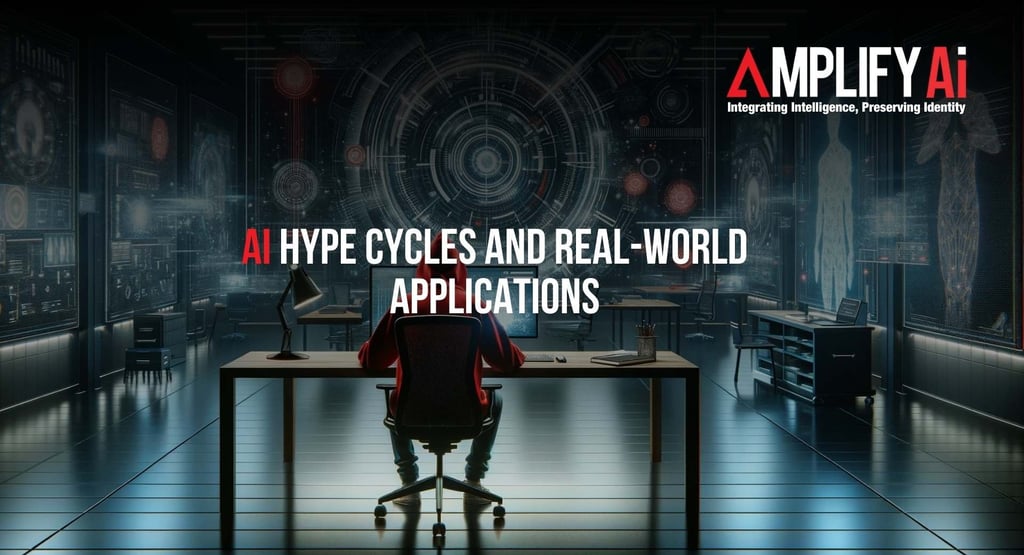AI Hype Cycles and Real-world Applications
Ronsley Vaz
4 min read


Artificial intelligence (AI) has emerged as a ground-breaking phenomenon that continues to captivate the imagination of tech enthusiasts and business leaders alike. The incredible promise of AI knows no bounds, as it holds the potential to revolutionise industries across the globe entirely and fundamentally transform the fabric of how we live and work. Nevertheless, amidst all the excitement and anticipation surrounding AI, it is of utmost importance to carefully discern between the extravagant hype and the tangible reality to fully grasp and comprehend the genuine value and inherent limitations of this cutting-edge technology in the present-day world.
The Hype Cycle Phenomenon
Like many emerging technologies, AI has gone through multiple hype cycles, where expectations soar to new heights before eventually coming back down to earth. These hype cycles are driven by rapid advancements in AI capabilities and inflated expectations of what AI can achieve.
In the early days of AI, there was excitement and optimism, with claims that AI could cure diseases, solve all our problems, and even surpass human intelligence. However, as the technology matured and real-world applications were explored, the limitations and challenges became apparent. The hype gave way to a more realistic understanding of what AI can currently accomplish.
Looking ahead, AI continues to evolve and improve with each passing day. Its potential applications span various industries, including healthcare, finance, transportation, and entertainment. From assisting doctors in diagnosing diseases to enhancing the efficiency of financial transactions, AI can revolutionise how we live and work.
Moreover, AI is not limited to individual tasks but can integrate with other emerging technologies like the Internet of Things (IoT) and big data analytics. This integration opens up new possibilities for AI, enabling it to gather and analyse vast amounts of data in real-time, leading to more accurate predictions and insights.
While challenges and ethical considerations still need to be addressed, the future of AI looks promising. As researchers and scientists continue to push the boundaries of AI, we can expect even more breakthroughs and advancements. The key lies in striking a balance between the potential benefits of AI and the responsible use of this powerful technology.
In conclusion, AI has experienced its fair share of hype and has come a long way since its early days. It has matured into a technology with immense potential to transform various aspects of our lives. With continued advancements and responsible deployment, AI can truly make a positive impact on society.
The Current State of AI
As of November 2023, Artificial Intelligence (AI) has reached a stage where it delivers tangible and significant benefits to businesses operating in various sectors. One area where AI has proven to be particularly valuable is in the realm of marketing and sales. Thanks to AI-powered personalisation, businesses can now establish deeper connections with their customers, gaining a profound understanding of their preferences, hobbies, and interests. This unprecedented level of personalisation has transformed how businesses market and sell their products and services, resulting in a more engaging and customised customer experience tailored to individual needs and desires.
Furthermore, AI has made remarkable advancements in operational aspects such as supply chain management and logistics. Companies are increasingly harnessing the power of AI to streamline their processes, optimise efficiency, and drive cost reductions, all while making informed decisions based on data-driven insights. In the financial sector, AI plays a pivotal role in portfolio optimisation, allowing businesses to maximise profits and identify lucrative investment opportunities by leveraging sophisticated algorithms and predictive analytics. Additionally, AI-powered chatbots are revolutionising customer service by providing instant and accurate responses to queries, effectively resolving issues, and enhancing overall customer satisfaction.
These are just a few examples that highlight the immense impact of AI across various domains. With its continuous advancements and innovations, AI is poised to revolutionise industries further, empowering businesses to unlock new opportunities, drive growth, and deliver even greater value to their customers.
Real-World Applications of AI
Beyond marketing, sales, and operations, AI is making an impact in various industries. In healthcare, AI is being used for disease diagnosis, drug discovery, and personalised medicine. AI algorithms can analyse vast amounts of patient data to identify patterns and make predictions, leading to more accurate diagnoses and tailored treatment plans. AI-powered robots are assisting surgeons in complex procedures, improving precision and patient outcomes.
In education and training, AI is transforming the way we learn and acquire new skills. Immersive environments and role-playing scenarios enable learners to practice and make mistakes in a safe space, enhancing critical thinking and problem-solving abilities. AI-powered educational platforms provide personalised learning experiences, adapting to individual needs and preferences. Virtual tutors and language learning apps harness AI to provide individualised instruction and feedback.
Ethical Considerations and Authenticity
As AI continues to evolve and become more integrated into our lives, ethical considerations become paramount. Transparency, accountability, and data privacy are crucial aspects that need to be addressed. Organisations must ensure that their AI systems are secure and free from vulnerabilities. They should also communicate the underlying algorithms and decision-making processes to stakeholders, fostering trust and understanding.
Furthermore, AI should not replace human judgment and intuition but rather enhance and augment it. Human oversight is essential to ensure that AI decisions align with ethical standards and societal values. It is crucial to strike a balance between the potential benefits of AI and the potential ethical concerns, such as privacy violations and biases. By incorporating ethical frameworks into AI development and deployment, we can mitigate risks and ensure responsible AI use.
The Future of AI
Looking ahead, AI is expected to continue evolving and transforming industries in the coming years. New use cases and applications will emerge, pushing the boundaries of what AI can achieve. Industries such as healthcare, finance, and education will witness further advancements and innovations driven by AI.
However, challenges remain, including the impact of AI on the job market and the need for upskilling and reskilling the workforce. As AI becomes more prevalent, certain job roles may be automated, requiring individuals to develop new skills that complement AI technologies. It is crucial for individuals and organisations to embrace lifelong learning and adapt to the changing landscape of work.
In conclusion, AI hype cycles are a natural part of the technology's evolution. While the hype may sometimes overshadow the reality, AI is making tangible contributions to businesses and society. By understanding the real-world applications of AI, addressing ethical considerations, and embracing the potential of AI in a thoughtful and responsible manner, we can harness its power to drive innovation and create a better future for all.

Subscribe to the podcast
Subscribe now to "Amplify Ai," and let's set sail together on this exciting voyage towards business growth and success.



